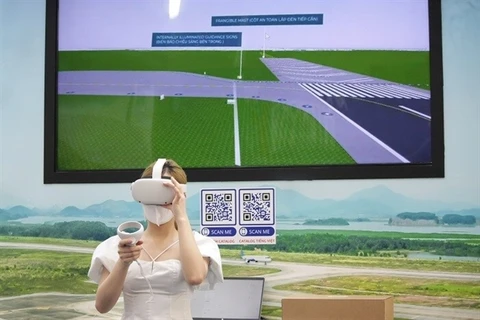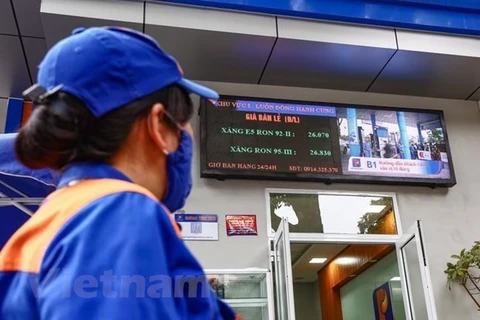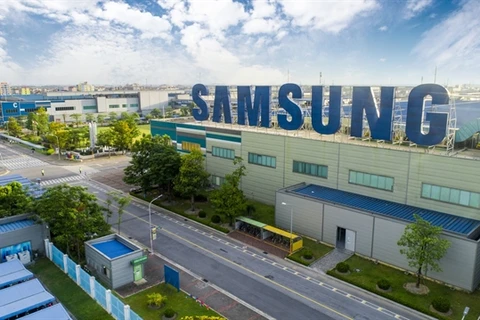 A farmer harvests coffee in Toa Tinh commune of Tuan Giao district, Dien Bien province. (Photo: VNA)
A farmer harvests coffee in Toa Tinh commune of Tuan Giao district, Dien Bien province. (Photo: VNA) Hanoi (VNA) - Despite global concerns over inflation and rising interest rates, Vietnam has emerged as a rare economic bright spot boasting healthy GDP growth and an array of opportunities.
An emerging market with one of the highest growth rates in the world, Vietnam has drawn significant investments from abroad, Nuntawun Polkuamdee and Nareerat Wiriyapong wrote in an article published by The Bangkok Post on September 19.
The country's bourse often offers a high rate of return on investment. At the same time, the nation is not expected to suffer from the high inflation and rising interest rates that developed countries are plagued by, raising the possibility that these nations might enter a recession soon.
In August, as bourses in developed markets declined, Vietnam's stock markets rebounded by more than 4% thanks to the government's continued capital inflows and economic stimulus measures. Vietnam's monetary policy is relatively moderate, particularly when compared with developed countries.
There are four key factors contributing to strong economic growth and attracting investors to Vietnam, making it one of the few countries offering high returns, said investment firm One Asset Management (ONEAM)
To start with, Vietnam's economy has continued its sturdy expansion despite the pandemic. Most recently, second-quarter GDP rose 7.7% year-on-year, accelerating from 5% in the previous quarter.
A recovery in consumption and the service sector following the country's reopening last year contributed to such growth. As a result, ONEAM analysts believe GDP growth for 2022 could soar to 6.1-6.5%.
Second, Vietnam's Planning and Investment Ministry data indicates that foreign direct investment (FDI) strengthened the country's reserves.
Third, land reform policies have been applauded, such as land appraisal using market prices and limits on agro-industrial areas not exceeding 20 hectares per factory. The policies ensure that land benefits the vast majority of the population, not just the wealthy.
The government has also introduced various infrastructure projects to ensure greater efficiency in tax collection.
Finally, Vietnam's stock exchange revised its securities trading regulations by reducing the settlement date from two to 1.5 days, which is expected to facilitate the launch of more sophisticated products in the future, according to ONEAM.
The World Bank cited heightened risks that threaten Vietnam's recovery prospects, including slowing growth or stagflation in the main export markets, further commodity price shocks, continued disruptions of global supply chains, and the emergence of new Covid-19 variants.
Domestic challenges include continued labour shortages, the risk of higher inflation and heightened financial sector risks.
"In the short run, on the fiscal front, the focus should be on the implementation of the Recovery and Development policy package and expanding targeted social safety nets to help buffer the poor and vulnerable from the effects of the fuel price shock and rising inflation," the bank said in its economic update for Vietnam on August 8.
In the financial sector, close monitoring and strengthening of non-performing loan reporting and provisioning, as well as adopting an insolvency framework, would be recommended, said the bank.
"If upside risks to inflation materialise, with core inflation accelerating and the consumer price index moving above the 4% target set by the government, the central bank should be ready to pivot to monetary tightening to quell inflationary pressures through interest rate hikes and tighter liquidity provision," the report noted.
In the report, the WB forecasted Vietnam's GDP growth to expand by 7.5% in 2022 and 6.7% in 2023, with resilient manufacturing and a robust rebound in the service industry as the driving forces for economic recovery.
According to the latest economic update by World Bank (WB) for Vietnam, the country's economy expanded by 5.2% in Q4 of 2021 and 5.1% and 7.7% in Q1 and Q2 of 2022. As a result, inflation is projected to average 3.8% over the year./.
























